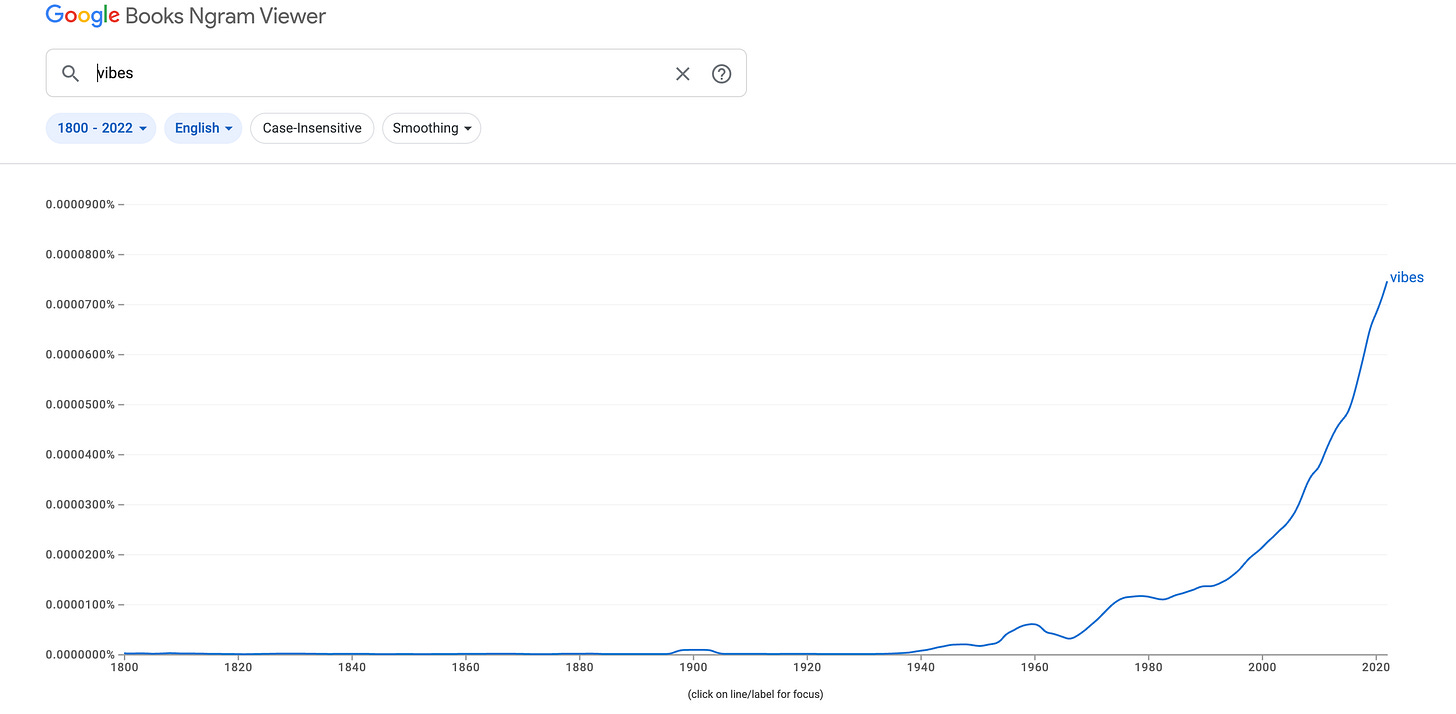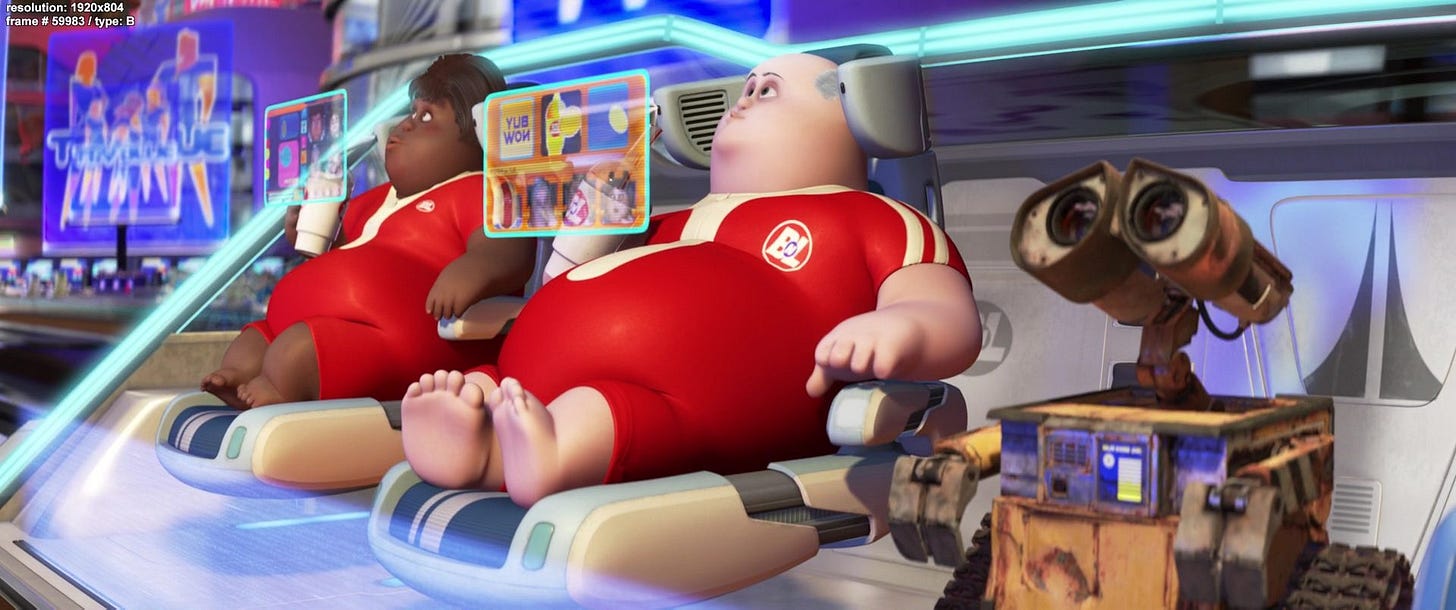The Vibes Have Completely Taken Over
Are we getting dumber because of it?
Picture the scene: a young magician named Eden Choi walks onto the stage at Britain's Got Talent. He's pulling cards from his hands, blowing smoke from his mouth, doing nothing revolutionary here that Shin Lim hasn’t already done before.
But by the time he's finished, the entire audience is on their feet in thunderous applause. He didn't fool anyone with anything novel. He just made it all about the vibes.
As one Youtube commenter put it succinctly:
Something is shifting in our culture. The word "vibes" has exploded into our vocabulary, and with that linguistic shift has come a deeper change in how we make decisions.
The dictionary defines “vibes” as: “A person's emotional state or the atmosphere of a place as communicated to and felt by others.”
But in the last few years, we've stretched that definition far beyond recognition into areas previously forbidden. Now we have "vibe coding", which is developers describing what they want to an AI and trusting it to build the actual software. There's "vibe revenue", where startups post growth charts that made everyone want to work there, even when the revenue might not be so real. And we even have "vibe investing," where venture capitalists fund founder’s social-media presence and normal cash-strapped students execute trades based on ChatGPT’s outputs.
A pattern emerges from these examples: “vibes” represent our reaction to systems too complex to actually understand. We have stopped trying to analyze what’s going on and started trusting our instincts instead. And just like with Eden Choi, we don’t care about how he is actually fooling us with his tricks; we just want to be entertained.
Why are we reverting to vibes?
There's a pivotal scene at the climax of Top Gun Maverick where Goose and Maverick are facing off against two advanced enemy fighter jets. With seconds to react and their lives on the line, Goose tells Maverick: "Come on Mav. Don't think. Just do."
In that moment, the advice is perfect. There's no time for calculation when missiles are incoming: pure instinct and training take over. But somewhere along the way, we’ve embraced vibes for treating every complex decision like aerial combat. We're applying "don't think, just do" to elections, policy decisions, and business strategy. There are situations where we actually do have time to analyze, research, and reason through options. We've taken a lesson that works in split-second scenarios and made it our default approach to navigating complexity. What's behind this retreat from analysis?"
My first theory is that we’re drowning in information. Social media platforms flood us with thousands of data points daily: news updates, expert opinions, conflicting studies, viral takes, and algorithmic recommendations. When faced with this torrent, our brains simply can't process it all analytically. Instead, we turn to our feelings about what’s true in the world.
We’ve shifted from a world of fact-checkers into one where misinformation is largely accepted. As experts continue to lose credibility through accentuation of their failures, people naturally retreat to what feels right rather than what experts say is correct.
And yet at the same time, are we modeling ourselves off of authority figures that are embracing vibes over fundamental analysis. When the President of the United States sets tariff policy off of vibes or proclaiming that immigrants are eating our pets, it signals that vibes-based decision making and communication is not only acceptable but effective at shaping what we believe in the world.
But most of the ideas are converging rightfully so to our utilization of tools we do not fundamentally understand. From recommendation algorithms to large language models, they all operate in black boxes that result in us deferring to them as all-encompassing truth-knowers. When ChatGPT writes code or Google Maps navigates us to our destination, we trust the outputs and move on, training us to accept results without understanding processes, making vibes-based thinking feel natural. If AI can solve problems we can't comprehend, why not continue to apply the same logic to other areas of life?
Each of these forces pushes us toward the same conclusion: analytical thinking is too hard, too slow, and maybe even unnecessary. Faced with complexity we can't process, we're psychologically retreating from understanding. But the consequences of this retreat are more dangerous than we realize.
What happens when give up on thinking?
First, let's be clear about what we're losing. Real intuition, the kind that actually works comes from compressed expertise. Maverick's split-second flying decisions work because he's logged thousands of hours understanding aerodynamics, enemy tactics, and aircraft capabilities. His "gut feeling" is actually pattern recognition built on deep knowledge.
Similarly, Elon Musk's business intuition comes from diving deep into the fundamental details of how things work. He spends sleepless nights understanding the minutiae of manufacturing, engineering, and operations until he builds comprehensive mental models. Only then can he make rapid, seemingly intuitive decisions about scaling businesses, because his “gut feelings” are actually informed by that deep foundational knowledge
But these situations are not exactly what we're doing with vibes. We're skipping the knowledge-building phase entirely and jumping straight to vibes or deferring to LLMs.
But when people abandon the hard work of understanding, the effects compound quickly. We find students would rather use AI to write their essays than struggle through developing their own thoughts. Every employees (rightfully?) delegate most tasks to LLMs and copy and paste the outputs without reading them. And we stop reading books because TikTok or AI summaries feel sufficient enough. We are forgoing the arduous journey so that we can skip our way to the end.
As Paul Graham warns, this might be catastrophic:
Isn't it common for skills to disappear when technology makes them obsolete? There aren't many blacksmiths left, and it doesn't seem to be a problem.
Yes, it's bad. The reason is something I mentioned earlier: writing is thinking. In fact there's a kind of thinking that can only be done by writing. You can't make this point better than Leslie Lamport did:
“If you're thinking without writing, you only think you're thinking.”
So a world divided into writes and write-nots is more dangerous than it sounds. It will be a world of thinks and think-nots. I know which half I want to be in, and I bet you do too.
When we outsource the difficult cognitive work, we don't just lose the output, we lose the ability to think clearly about complex problems.
And individual habits become societal problems. Institutions, governments, companies, and universities are only as smart as the people running them. When those people operate on vibes rather than understanding, the institutions themselves become fragile.
We get policies based on Twitter sentiment rather than evidence. Companies make billion-dollar decisions based on what "feels" innovative. Universities lower standards because rigorous thinking is "too hard" for students.
These aren't just bad decisions, they're decisions made by people who've lost the capacity for systematic analysis. The institutions start to mirror the cognitive shortcuts of their leaders. And each shortcut makes the next one easier to justify.
If AI can write code we don't understand, why not let it make business decisions? If politicians can govern by gut feeling, why not skip policy analysis entirely? If students can graduate without deep thinking, why maintain academic rigor?
We risk becoming like the humans in Wall-E, comfortable and entertained, but fundamentally unable to do anything once the systems we depend on break down. Not because we lack intelligence, but because we've trained ourselves out of using it.
The vibes feel good until reality hits. And reality doesn't care about our feelings.
The Curiosity Solution
I’ll admit that even writing this essay, I'm confronting the tension with Graham's warning. Claude helps me structure my ideas and polish my sentences in ways I might have struggled with endlessly before. My writing process before I hit publish now involves taking paragraphs out of my essay and asking Claude "how do I make this sound better?" until many times reaching something that doesn’t feel entirely my own.
But again, there is a difference between “vibe writing” and the care that I put in the writing process. I still re-read every word and sentence to make sure it’s coming out the way I want it to. Am I still thinking, or am I just managing an intelligent autocomplete? The line between assistance and replacement is thinner than I want to admit.
But here's what I've realized: at least I’m still writing. I don’t nearly have to of course. I don’t really make money on the blog. I have less than a thousand subscribers. But I'm genuinely curious about ideas and wrestling with complex thoughts feels rewarding. I enjoy the act of sharing something that did not exist in the world before.
And that curiosity to me makes all the difference.
My optimism extends to how I think about the first caveman who discovered fire by accident. Maybe lightning struck a tree, or some sparks flew from him angrily throwing rocks on the ground. He could have just enjoyed the warmth and moved on when it died out. But cavemen got obsessed with wanting to understand how to create fire themselves, how different materials burned, how to make it bigger and hotter. They didn't necessarily need to become fire experts to survive, but their curiosity drove them to master it anyway.
The same principle applies today as we have evolved to modern life. We don't need to understand how our phones work or write by hand to communicate. But some people remain obsessed with understanding anyway. As Adam Mastroianni puts it, everyone is 'crazy' in their own specific way. And it's this kind of obsessive curiosity that has driven most of human progress.
As long as humans have passions they want to pursue, weird interests they can't let go of, problems they're determined to solve, things they want to build just because, we won't lose our capacity for deep thinking. Curiosity is the antidote to vibes-based living.
But let's be honest about the challenge we face. Not everyone will choose the hard path of understanding over the easy path of vibes. Most people won't develop the obsessive curiosity of Mr. Beast towards reaching a billion Youtube subscribers. But what matters is that each person finds something they genuinely care about exploring.
The vibes revolution isn't going away, but maybe we can at least ensure it doesn't take everything with it.




